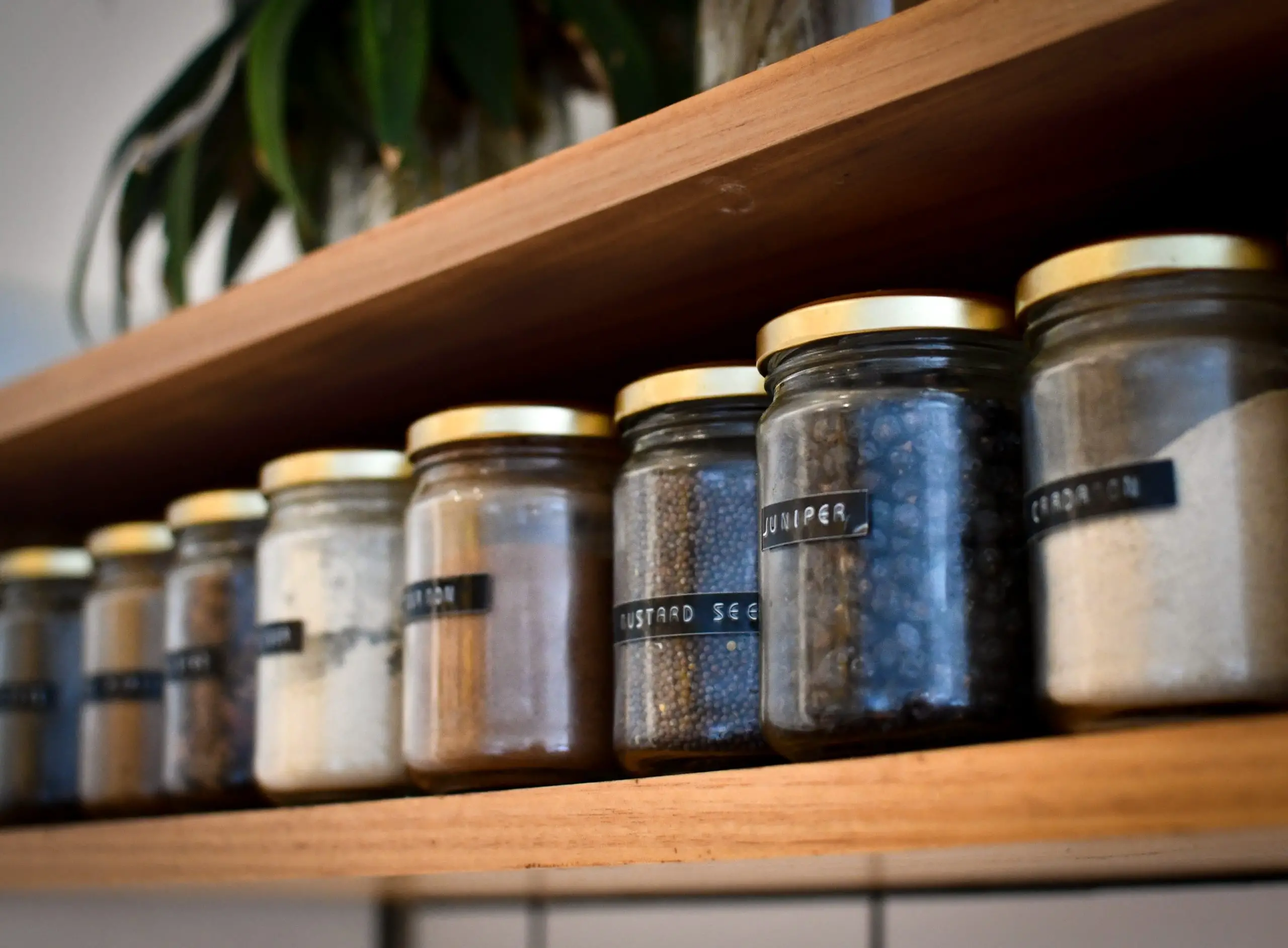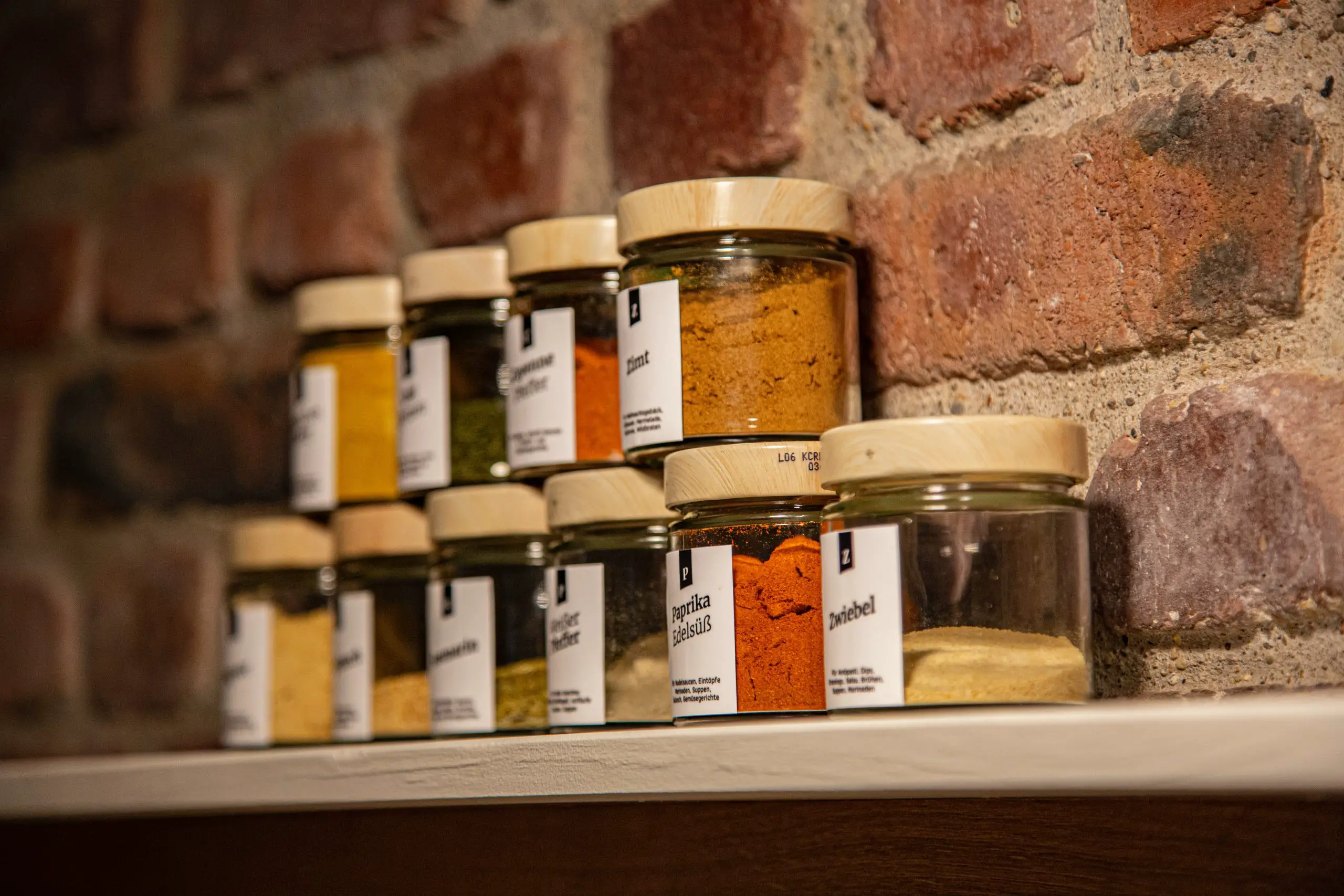If you’ve been wondering how to store spices, you’ve come to the right place. There are a variety of containers available for storing spices, from stackable tins to Mini mason jars. You can even use metal pouches or ceramic jars. However, keeping a few things in mind before storing spices would be best.
Store dried spices and herbs away from direct sunlight in a cool, dry location to preserve the flavor for as long as possible. Avoid keeping them near a stove, as the heat will cause them to become bland more quickly. When not in use, keep the containers closed. Additionally, fresh herbs must be properly preserved.

How to Store Spices?
How to keep spice jars organized in the kitchen is one of the most common queries I get as a professional organizer. You probably have a lot of herbs and spices clogging up a cabinet, drawer, or pantry, whether you cook frequently or infrequently. They might even be dispersed throughout all three areas, making it challenging to locate the ingredients for your brand-new recipe.
Spices should be organized to make it simple to determine when they need to be refilled and when they should be thrown out to keep them fresh for as long as possible. You can more frequently and effectively check when the jars are low, and the expiration dates when you can view them all in one location.
If your spice collection needs a better system, consider the suggestions below.
1. Mini Mason Jars
Mini mason jars are the perfect size to store spices. They can be purchased in two-ounce, four-ounce, and eight-ounce sizes. You can coordinate their size with other kitchenware, such as a wooden rack or colorful pots and pans. However, these jars aren’t the right choice if you plan to store taller items.
Another good option for spices is the use of plastic jars. These spice jars have plastic tops that allow you to sift and pour spices. These jars are designed much like conventional spice jars. They have a metal twist-top lid, and they also come with plastic lids that snap on beneath the metal lids.
Depending on your kitchen, you can also purchase magnetic jars attached to the refrigerator. Another great idea is to label small mason jars with their respective spices. This way, you won’t have to worry about them getting bugged.
2. Metal Pouches
Spices come in various shapes and sizes, and stand-up pouches are ideal for spices. These pouches are sturdy and have large front and rear sides. They can be customized with up to 10 colors and are strong enough to stand up independently. In addition to providing an attractive display, stand-up pouches can keep spices fresh and flavorful for a long time.
Unlike cans, metal pouches have an extended shelf life. The average shelf life of food packed in a can is only two to five years. After that, metal cans are more likely to transfer metal to the food. On the other hand, stand-up pouches have a much longer shelf life, as they have been tested for eight to ten years.
3. Use a Spice Riser
What’s best? If you would rather keep your spices in a cabinet, consider adding a shelf organizer to keep the containers neatly arranged. A riser uses the entire cabinet, making it simple to see and reach for jars. Numerous organizing tools can be expanded to fit a range of cabinet widths, making it simple to reorganize as necessary.
4. Put a Lazy Susan to Work
I want to share this expert organizing tip because it improves storage space: using a round organizer, like a lazy Susan, to keep circular goods. Therefore, they are the ideal place for most spice jars. If you have a large variety of spices and herbs, either use a two-tier lazy Susan to hold them all or arrange two side by side in a pantry or cabinet.
5. Save Space with a Snap
Small kitchens need more creativity to make the most of the available space. Therefore, when it comes to organizing spices, think creatively. Spice jars can be mounted to the interior of a cabinet door because they’re not as large as other pantry items. Since you’re using unused space and storing clutter, it’s a win-win situation.
6. Put Up a Pretty Display
Perhaps you use the fewest amount of spices possible in your cooking. If so, you might want to consider displaying them above your countertop. An attractive storage solution is a set of Mason jars in various sizes arranged on a floating shelf. Add personalized labels so that each cook in the household knows exactly where to look for the spice they require.
Why Store Spices as Part of Prepping?
When prepping on a tight budget, your food stockpile likely consists of many dry staples like rice, oats, beans, and dried fruits and vegetables.
These foods are incredibly bland on their own. Without spices to flavor them, your emergency meals would be very bland.
Even though most catastrophes are temporary, the flavor may not matter when surviving the end of the world. Eating meals you enjoy can greatly improve your mood!
You should probably stockpile spices even if you purchase meals from reputable emergency food suppliers. Not exactly the most flavorful meals, those. Additionally, spices can add nutrients to your food, such as antioxidants, which are frequently absent from most emergency meals.
Do Spices Go Bad?
Spices can spoil, it’s true. Most spices will go bad after a year if left in their original packaging unopened. Herbs that are dried expire after two years. The spices will quickly start to lose their flavor once they are opened.
What Makes Spices Go Bad?
Spices’ natural oils are where their flavor is kept. These natural oils have high volatility and rate of breakdown.
The flavor of the spices will be lost if they are heated and exposed to oxygen. Spices’ nutrients will deteriorate over time as well. Although the spices may still be safe to consume, their flavor will likely be diminished, defeating the purpose of storing spices in the first place.
Pantry Pests Also can Get into Spices
Some spices are particularly tasty to pantry pests like weevils and moths. Although eating insects in food is generally safe, it can be disgusting (speaking from personal experience, weevils give food a nasty crunch!).
Is it Safe to Eat Expired Spices?
In general, it is safe to consume expired spices. Spices can’t easily support the growth of bacteria, fungi, and other microorganisms due to their low moisture content.
In addition to being rich in antioxidants, many spices also naturally fight germs. As a result, it is quite improbable that ingesting expired spices will make you ill. In truth, spices are frequently added to food to avoid food illness or used to cure it.
Remember, though, that spices can draw moisture from the air. In humid locations, the spices could become moist enough to support the growth of germs or mold. Most dangerous microorganisms are killed when spices are heated to 167 degrees F.
Three Storage Tips for Maximum Freshness
- Because of the humidity and temperature swings that might lead to moisture formation, storing spices in the refrigerator is not advised.
- Before scooping out the spices, make sure the spoon is dry to ensure that no moisture seeps into the jar.
- Spices that are intact will often last twice as long as those that are ground.
Five Creative Ideas for an Organized Spice Setup
- Stackable tins are great for tiny pantries since you can place labeled tins on top of one another and quickly locate your spices.
- Small jars are kept neatly arranged in drawers thanks to a wonderful invention called drawer inserts.
- Small mason jars: Look for miniature mason jars, paint the lids with blackboard paint, and then label them.
- Magnets: Attach metal canisters to a magnetic strip that you place on the interior of your pantry. They can also attach to some refrigerators, although light exposure makes this unwise.
- Hang them: Screw in a few tiny hooks to the cabinet’s interior, then suspend your spices from the wires.
How Long should Spices Last if Stored Correctly?
Spices don’t have expiration dates; instead, they taste and smell bad. When properly stored, they will last roughly the following amount of time:
- Whole spice: two years or older
- up to a year for ground spices.
- Herbs with leaves: 1 to 2 years
- Indefinitely for salts.
We advise you to keep your spices in their spice bags for no more than two weeks if you self-scooped them from our store. Despite being lined, the bags are not completely airtight; ground spices, in particular, will retain their flavor and potency longer in a jar or other airtight container. To prevent aroma taint, put each bag in a different container or jar. Cardamom is a well-known contaminant crucial for strong spices and mixtures!
How do I Keep My Spices from Clumping?
If any of your mixes or spices clump, break them up with a spoon and use them as usual. Our mixes don’t contain any preservatives or anti-caking ingredients. Therefore some of them naturally tend to clump. This is typical because some spices have a larger moisture content than others; juniper berry, for instance, retains moisture even after it is dried.
Always store items in an airtight jar or container and keep them out of the sun, away from moisture and humidity, and out of the heat.
Conclusion
Our regular diet includes spices, which have a long history. Hey, they have been used for thousands of years for their capacity to preserve food and improve flavor and other health benefits.
It isn’t easy to think of a single meal without any spice. In a nutshell, spices are the essence of life since they balance the flavors of common ingredients and give them a whole new flavor profile while meeting our nutritional demands and fostering wellness.

